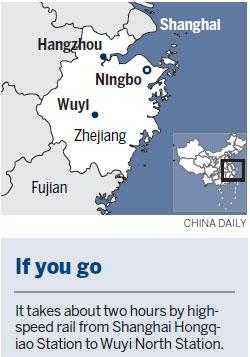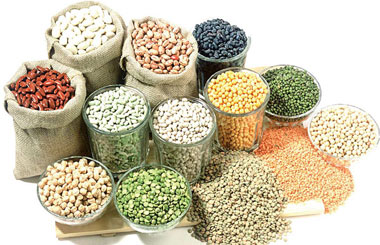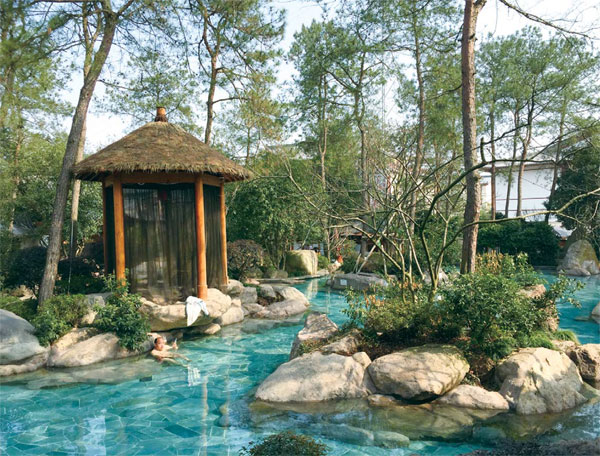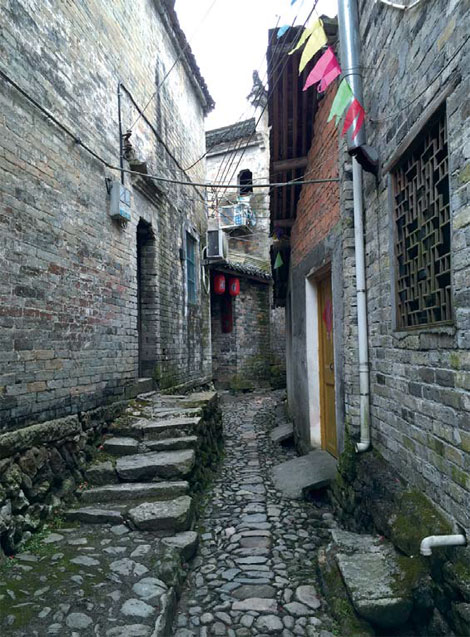Reaching boiling point
Updated: 2016-03-18 08:42
By Yang Feiyue(China Daily Europe)
|
|||||||||
|
|
Hot springs make Wuyi in eastern China a relaxing rural getaway
It may technically be a county, but for many Wuyi is known as the city of hot springs.
Covering 1,577 square kilometers, this area in the eastern province of Zhejiang boasts 13 hot springs that together provide more than 24,000 metric tons of water a day.
Although only two sources have so far been tapped, one local officials tells me that Wuyi "still leaves many hot spring getaways in the shade".
I made a short trek up the tortuous road that leads to Tangfeng Hot Springs. At night, dim polychromatic lights suffuse the open-air pools, which are separated by tall trees and thick bushes. It's like the kind of lush garden found south of the Yangtze River.
I visited in late February, a perfect time to enjoy a hot spring, as there is still a chill in the air. The peak season is October to May.
It costs 248 yuan ($40; 35 euros) a night to stay at Tangfeng, which includes two meals. Sheng Xibin, the owner, has been in the business for 15 years. He used to be a lawyer but fell in love with hot springs while on a business trip to Japan in the 1990s.
"It was magical to dip into the hot spring with snow piled around and the view of Mount Fujiyama in the distance," he recalls.
He got to know of the hot springs in Wuyi when he was dealing with the bankruptcy case of a local facility owned by the county government. Sheng didn't hesitate; he quit his job and took over the bankrupt business.

He immediately moved all the facilities from indoors to outdoors and reopened the business in 2003. He also renovated sections that date back to the Tang Dynasty (618-907). "You can see portraits of ancient maidservants here," he says.
Now, Sheng is trying to get support from the local government to build a museum to show the public the benefits, culture and history of hot springs. He hopes this will help people get a better understanding before experiencing them.
"For example, you should bathe in advance and never scrub yourself in a hot spring," he says.
The businessman has also launched a mobile app that offers a butler service. "We'll have people take care of you from the time you step out of the high-speed rail station all the way until you get back on the train."
Wuyi's hot springs have helped put the county on the tourist map. It received 8.6 million visitors last year, up 41.24 percent on the previous year, while tourism revenue surged 53 percent to 7.5 billion yuan. Roughly 1 million visitors headed for the hot springs.
Qing Hot Springs, which covers 130,000 square meters, drew 50,000 people during the Spring Festival holiday, raking in 1 million yuan a day. The complex has a spa, karaoke bar, gym, basketball and tennis courts, and a wave-simulation pool.
"We want it to be a scenic spot, not just a place for hot springs," says CEO Huang Lujun, who adds that the business has targeted guests from Shanghai and Wenzhou since the opening of a high-speed link to Wuyi this year.
The local government has used the hot springs to develop tourism in the county since 1994. Today, a 3.8-sq-km area has been earmarked as a resort, which includes Qing Hot Springs, ancient residences and a fluorite museum.
Jingyuan Park has more than 80 structures dating back to the Ming (1368-1644) and Qing (1644-1911) dynasties. My nostrils were filled with a plum blossom fragrance as I entered the park, and walking past each building was like flipping through a history book.
The fluorite museum is an eye-opener, too. It displays crystallized minerals with polychromatic colors, such as a 94.7-ton crude fluorite stone, the world's biggest luminous fluorite ball at 1.75 meters in diameter, and a feast with 108 dishes made from fluorite and jade.
In all, the Wuyi tourist resort is forecast to attract 3.5 million people a year by 2017 and generate 3.5 billion yuan.
The hot springs have also benefited residents. The county has nearly 20 villages, where many locals have opened hotels or restaurants offering visitors "farmhouse cuisine" for the growing number of tourists, who come mostly to savor the natural environment.
Last year, 3.7 million people visited the villages, with some households making more than 500,000 yuan, according to local officials.
He Guangxing, who is in his 50s, has had a family-run restaurant in Guodong village since 1999. The eatery is in a 400-year-old, two-story building made of stone and wood, and can cater to up to 20 tables at a time. He says his annual income ranges between 100,000 and 200,000 yuan.
To further promote the area, a hot spring festival is also held every year in October and November. It involves celebratory events and discounts on goods and services, officials say.
Zhang Xinyu, the county head, says bars, a shopping plaza, F3 racing tracks and health facilities will all be built in the future to enhance the hot-spring experience. "We'll even provide hot-spring water to local hospitals to treat patients," he says.
Wuyi is also expected to get an airport in the next five years to connect the area with Zhoushan and Hengdian World Studios, a major movie-making base, while work on an expressway connecting the county with downtown Jinhua city will begin this year, which will shorten travel times from an hour to 15 minutes. Zhang says more than 90 percent of Spring Festival visitors drive to the county.
In addition, a group of high-end family hotels will open for business this year.
yangfeiyue@chinadaily.com.cn
|
|
Today's Top News
EU to pitch migrant plan to Turkey
DPRK fires medium-range ballistic missile
Virgin Atlantic investigates abuse case
as story goes viral
Shanghai firm is latest Chinese investment in UK soccer business
Sino-UK documentary on Chinese New Year a hit
A 24-year-old PKK member is Ankara bomber
China to lead development of Swiss SMEs
Putin says Russians to start withdrawing from Syria
Hot Topics
Lunar probe , China growth forecasts, Emission rules get tougher, China seen through 'colored lens', International board,
Editor's Picks

|

|

|

|

|

|








